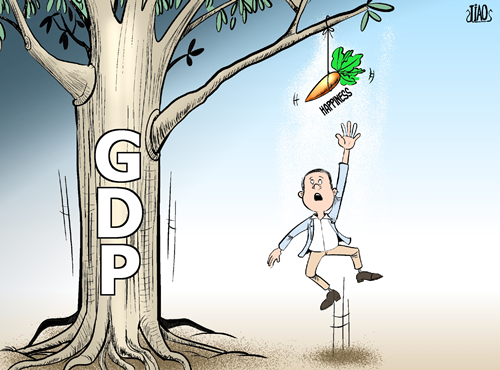Tax revenue too high
 0 Comment(s)
0 Comment(s) Print
Print E-mail China Daily, July 16, 2012
E-mail China Daily, July 16, 2012
|
|
|
Gross Deceptive Product [By Jiao Haiyang/China.org.cn] |
The exceptionally high growth in fiscal revenues for the first half of this year is eye-catching, especially considering the hard times the economy is facing.
While its GDP growth rate dipped to 7.6 percent in the second quarter, the lowest in three years, China's fiscal revenues for the first two quarters, the bulk of which are from taxation, grew by 12.2 percent.
And even though the economy has slowed, there was a 21.1 percent growth in corporate business tax revenues in June, much higher than its overall tax revenue growth in the same month.
This rise reflects the fact that some local governments stepped up their tax collection in June in order to meet their budgeted target for the first half of the year.
The tax bureau of a county in Gansu province, for example, managed to collect taxes equivalent to 32 percent of its budgeted target for the first half of the year in just 20 days, according to the China Business News report.
The tax collectors concerned said they had collected the taxes without abusing their power or adding to the tax burdens of local enterprises. But the fact that China's overall tax revenues have continuously increased in the past decade despite the fluctuations in the national economy is thought provoking.
Even in 2009, when it had to mete out massive spending to combat the fallout from the 2008 global financial crisis, the country achieved a tax surplus of more than 200 billion yuan ($31.27 billion).
Although it brings in quick money for the country to combat the economic slowdown, such an increase regardless of economic conditions is dangerous in the long run.
In times of economic difficulties, enterprises fall victim to reduced demand and a stagnant market. A stable and predictable taxation system, which takes into consideration the financial difficulties of enterprises, will help them ride out the downturn.
However, despite their claim that they are abiding by the rules, local governments seem to be tightening the screw on businesses making it even harder for them to navigate the uncertainties.
As the corporate sector holds the key to stable growth and job creation, a more predictable taxation system is a must.






